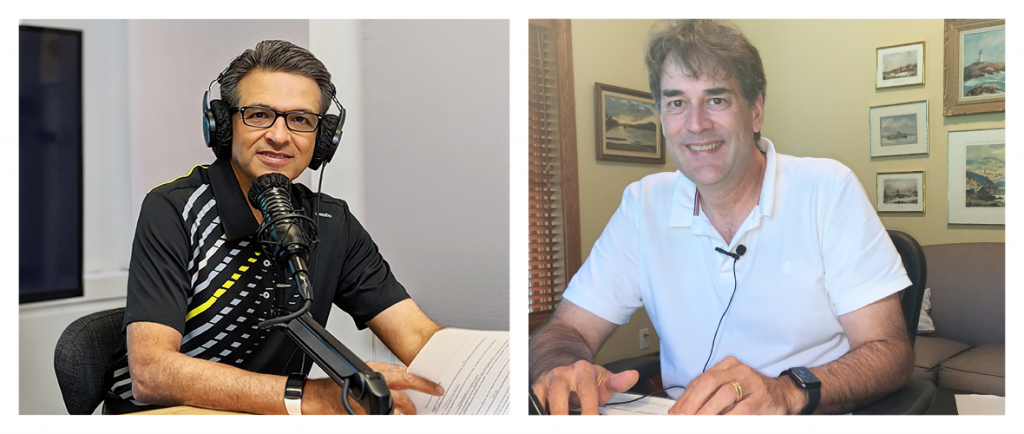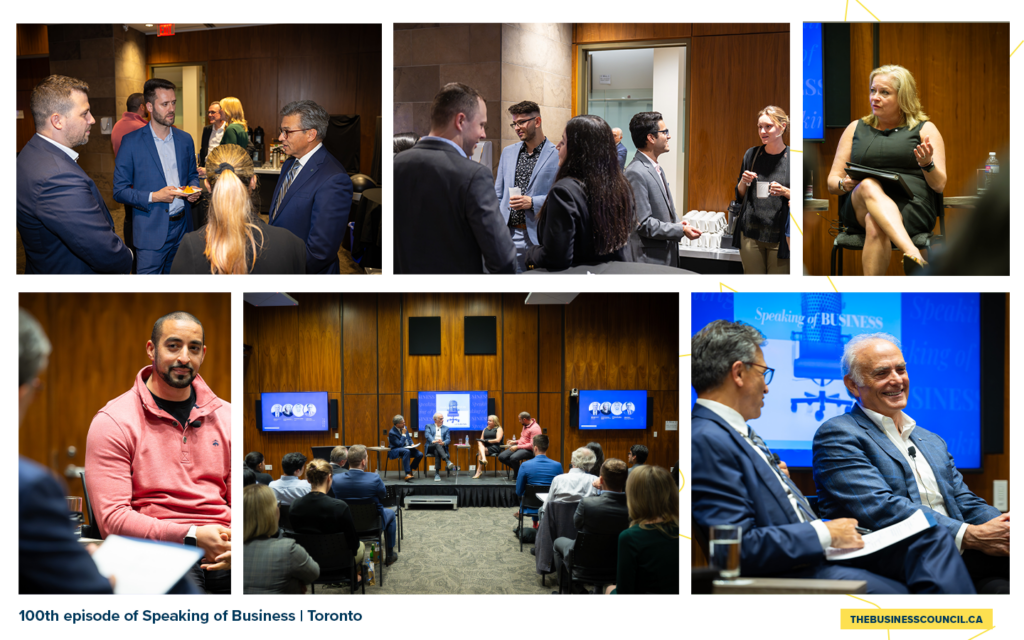What’s it like to start a new job in the middle of a global pandemic? Claude Guay knows. He became President and General Manager of IBM Canada last May.
Since then he’s been finding creative ways to connect with employees and clients, while developing solutions to help the country respond to the economic and health crisis.
How do you stay agile as a leader in a world of disruption? What role will innovation play in helping Canada rebuild? And what needs to happen to ensure the future workforce has the training and skills the country needs?
Claude Guay joins us with his unique insight and perspective.

Claude Guay:
Going into the pandemic, we were concerned about the skill gap. Now, it’s even more top of mind because, okay, we all want this acceleration. Now, do we have the people, the team to be able to do that? That’s important from an organization company standpoint, but I think from a society, Goldy, it’s critical because there is a danger that we leave people behind, that we create a bigger divide in between the have and the have-nots.
Goldy Hyder:
Welcome to Speaking of Business, conversations with Canadian innovators, entrepreneurs and business leaders. I’m Goldy Hyder of the Business Council of Canada. I don’t know about you, but I’ve learned a lot about our country over the last few months. I’ve seen firsthand, how resilient Canadians are as we have all learned how to adapt to new ways of living and working in the face of a global pandemic. I’ve appreciated more than ever, how kind we can be to one another; neighbours helping neighbours, businesses supporting communities, front-line workers putting other people’s needs before their own. And I’ve learned how much we can accomplish when we work together. I’ve seen factories retooling to produce medical supplies, airlines repatriating Canadians from overseas, banks deferring mortgages and loans, telecoms keeping people connected, countless offices switching to work from home models.
Goldy Hyder:
By working together, we managed to beat back a looming health crisis and by continuing to work together, we can address new challenges as we all learn how to live with a new virus in our midst. Claude Guay knows a lot about tackling new challenges. As president and general manager of IBM Canada, much of his work centers on helping people adapt to a changing world. An engineer by training, his focus is on finding solutions for complex problems. But he also brings a unique perspective as a business leader. He took over the reigns at IBM Canada in May. Yeah, this May in the midst of the pandemic. What lessons has he learned from these past few months? And how does he think Canada can come out of this stronger? Why don’t we find out? Welcome to the podcast, Claude.
Claude Guay:
Thank you, Goldy, much appreciated.
Goldy Hyder:
So let’s talk about you taking over the reins at IBM Canada in the midst of a global pandemic. What was that like? Yeah, exactly. Stutter, stutter, stutter. Hard to answer, isn’t it?
Claude Guay:
Yeah. Well, there’s nothing traditional about that.
Goldy Hyder:
No.
Claude Guay:
In my career, you go from role to role, or company to company and you kind of have an expectation of how this happens and you expect some new things, new people, new situation, but not quite what I’ve experienced recently, where the experience is mostly on video conferences, a lot of video conferences, spending my days with small, short breaks and trying to reach out to everyone in a digital fashion. I’m someone that enjoys meeting people and managing by walking around. When I take on a new role, I tend, for the first 90 days, to get a lot of feedback and information, in as much as an informal fashion as I do in a formal fashion. So doing this in the context of the pandemic and the working from home has been an interesting experience. So that’d be the first point.
Claude Guay:
And the second one is, I think you mentioned it in your intro, Goldy, about overall Canada, but this is what I’ve been most stunned by is how resilient, resourceful, smart and caring the IBM-ers, my team, is across the country. And of course, that’s a representation of Canada as a whole, but it’s never been that much clearer. You gave some example. I have similar one. I have people in a technology company that have been making masks, delivering groceries, supporting local schools, mentoring students, not only their own kids, but other kids, teaching STEM online, coding for kids, creating summer camps; so a lot of amazing activities by the team. This is aside from all the work that they had to do from a technology perspective to help our clients through.
Goldy Hyder:
Well, tell us more about that because if there’s one thing we’ve learned, thank God for the technological capabilities, thank God for the investments made and connecting Canadians. How has that helped you take on the reins and how has it helped you in terms of bringing focus for what you’re trying to do now at IBM?
Claude Guay:
Yeah. So the good news is we have an awesome chief information officer department within IBM. So the switch for the IBM company globally, because we even have people all over the world that supports our Canadian organization, happened in a matter of days. We were like, I would say, probably within two weeks, we were at 95 per cent working from home. So the team didn’t miss a beat thanks to our own technology infrastructure and business continuity. So that allowed us to actually focus on our clients.
Claude Guay:
One of the things that I worry a lot about is the health of our team, as well as the health of our clients. As I speak to business leader across the country, all of us, I would say the vast majority, if not all, are concerned about potential, additional issues from a mental health perspective. Some of the challenges of running a business from home, it’s not made for everyone. People have different situation, people have different psychological background, but also the home pressure that could be associated with that. I’m fortunate, I’m an empty-nester. So aside from my wife and my cat… And by the way, he’s been making appearances on some of our video conference. Thank God he’s very cute. So we’re good.
Goldy Hyder:
Well, there’s a lot there that we can unpack. Why don’t we start with, this is airing now in the fall of this amazing year, 2020, how are you managing the return to work for IBM in Canada? And is it different than how others in the global network might be managing things?
Claude Guay:
It’s the same and it’s different. I feel like a consultant when I say that, but we actually have some guiding principles around the world, Goldy, so we work with the local health departments of the different governments around the world. And of course, we always aspire to be good citizen within our community. So we do adapt to each one in Canada. It’s actually adapting to provinces and cities and region. But we do have an overall that, first, is we care about our employees’ health and security. So that first and foremost. So we could have even more stringent, more conservative approach around the world but we adapt to each one of the locations that we operate on because safety in Canada might be different than safety in the U.S., Or it might be different than safety in India, for example. So we have to take that into consideration, and we have different phases that I’ve been established corporate-wise; wave one, wave two, wave three and different countries and region or a different place in the waves.
Goldy Hyder:
So what are you expecting for Canada as you look ahead as we co-exist with the virus? You’re a business leader. You are looking, I assume, to continue to grow your business and to have an impact. How are you managing that as you look forward?
Claude Guay:
Yeah. I think we are going to be on the conservative spectrum because of what I said. Also, we have a business, of course, that is applicable to being able to do more work in the virtual world just by definition of what we do. We’re starting to plan work that could be done in person. What would the facilities look like, how they would be booked. We have no immediate plan to bring people back to work from a full-time basis if the work can be done in a remote basis.
Claude Guay:
We’re looking at some small pieces of work that actually are better done in person for customer deliverables and things like that. Which facilities would we use to do that is really where we are in the plan. So there is no plan in the near future, Goldy, on bringing everybody back to work while we’re in the pandemic. So it’s going to be done in steps, secure steps. We’ve packaged a bunch of software hardware applications so that we can actually do our own track and trace of our employees, figure out who’s there, what they’re doing and be able to also to have the hygiene policies held safely within those locations so that we can take them on.
Goldy Hyder:
Now, you mentioned in your response there, somewhat of a reliance on technology and the utilization of technology as an enabler to manage the pandemic; obviously contact tracing, e-commerce, working from home. Now, you’ve got a front row seat to witness a lot of these changes. I’m wondering how you see the continued advancement of technology shaping Canada’s economic recovery.
Claude Guay:
Wow. That is a great question, and one that I spend a lot of time thinking about discussing with clients, with my team. What we’ve seen, Goldy, is an acceleration of the digital world, digital transformation. Many leaders across the country were talking, I insist on the word, “talking,” about digital transformation versus right now, they’re doing, and this has been the-
Goldy Hyder:
It’s a disruptor in a way, isn’t it?
Claude Guay:
Yeah. It’s a huge disruptor. And I think in the future, we’ll look back history, we’ll look back at this moment where a digital transformation of business and society suddenly accelerated. It will be in history, probably a turning point. It will be, for many bad reason, the impact on society, but for good reason, or I think the good that’s going to come out of this is the acceleration of digital transformation. I think it’s critical that Canada, Canadian organization actually position themselves to play in this accelerated digital world.
Goldy Hyder:
Are you seeing that happening? You’ve got a lot of access. Do you feel that that’s taking place?
Claude Guay:
Absolutely. Every Canadian leader that I’ve talked to is actually spending time on this. I think, I would say there’s probably three trends, Goldy. One is we’re going to see more open, secure, decentralized based on different cloud capabilities or different providers that companies and organization are going to rely on, number one. Number two, I think automation will fuel the future of work. And probably the third one is the winners will be, the ones that will scale, I think understanding the value of the data that they have and leveraging AI and automation.
Claude Guay:
We’ve seen organization doing incredible things in very short period of time as we went into the pandemic and actually, a lot of leaders that I talked to say, “How do I stay agile and rapid and flexible like we did in those first two, three, four weeks of the pandemic where we’ve accomplished amazing thing? We’ve scaled e-commerce and we were able to put these new application in place.” And, if you look back, they would say these things that they did, if they had been planning, would have take months, if not, years within their normal-
Goldy Hyder:
Because there’s no urgency, right? There was no urgency.
Claude Guay:
Yeah. So how do you keep that feeling of urgency? But we put barriers, in many cases, this inertia of moving forward. We’ve actually, because of the pandemic, did a way with a lot of it. I’m not saying that it should always be like that. I’m not saying this should be at that speed, but I’m saying it actually taught us that there was a lot of things and steps and these traditional very waterfall ways of doing projects. There’s better ways to do that.
Goldy Hyder:
Many have said that this has been sort of what’s holding Canada back, our culture of comfort and complacency created what you just talked about, which is “our process is acceptable. We can defer decisions”. So I’m glad to hear that that’s taking place because ultimately, it’s going to be key to growth. I want to talk to you a little bit about that because one of the things that I know is a tremendous passion of yours, and you and I’ve talked about this before, is the changing workplace, if you will, and the importance of skills and diversity as we look ahead. Tell us what you’re seeing happening in Canada on those issues.
Claude Guay:
Yeah. So again, an amazing question that I spend, probably because of our previous conversation, you need to go there, but the skills. Imagine what I just talked about; cloud-based, open, secure, so cyber security, open-source software, automation, AI. So think about all the skills that you require as a company to be able to do that. I’m not talking just about IT people. I’m talking about business people knowing how to deal with this new environment being educated.
Claude Guay:
So I’m very concerned, and I think most leaders across the country are concerned. By the way, going into the pandemic, we were concerned about the skill gap, right? You and I have talked about that. We’ve made representation on the skills gap. It’s been top of mind for CEOs across the country. Now, it’s even more top of mind because, okay, we all want this acceleration. Now, do we have the people, the team to be able to do that? So that’s important from an organization company standpoint, but I think from a society, Goldy, it’s critical because there’s a danger that we leave people behind, that we create a bigger divide in between the have and the have-not.
Goldy Hyder:
So what hope can you give those people? Because that’s exactly what people are talking about in the real world. Many jobs are not going to be returning. I think there’s this perception that automation is going to take the place. Yet, you’ve just said it. You and I both know it. One of the answers to the question what’s keeping CEOs up at night is talent, retention and recruitment, or recruitment and retention. What hope can you offer those people to show a path forward in re-skilling and being employable as we look?
Claude Guay:
Yeah. We spend a lot of time, as a company, around this topic. We’ve created that platform called IBM SkillsBuild, for example, Goldy, which is a digital learning platform. We’re working with nonprofits like Access Employment and youth employment services, and even TD is participating in this exercise, which actually provides content and mentorship. We have other initiative that I hope to be able to announce in the near future where we’re bringing teams to actually customize curriculum so that we can offer either… We’re actually in Technovate doing it with non-profit organization because you and I both know the challenge of nonprofit in the pandemic. You need to go digital. Some of these organization were even more technology debt oriented than large corporate organization.
Claude Guay:
So helping these folks, helping also people that are looking for employment, to your point earlier, how do you mentor them? How do you take, whether they have a high school degree, or even in some cases, take them into high school, take less privileged organization, take them into… We do coaching program. We do residence in IBM. We have something called P-TECH, which is really a short for Pathways to Technology where we’re actually helping high school with the curriculum, so that they can actually graduate student that will go into technology.
Claude Guay:
In the past, it wouldn’t have been like, “If you don’t have a university degree, you’re not going to go into technology.” So how do we extend those capabilities to Aboriginal and to areas that are more challenge to actually have access to technology oriented job? Automation, we’re teaching these days, we’re teaching young girls, 10 years old to 14 years old, to actually code AI. So we can actually do provide Canadians that may have been doing something very different in the past, a business that’s not going to reopen post pandemic and we can actually offer them a completely different path. We can help entrepreneurs access to some of these technologies for new types of businesses. I think that’s critical. I know there’s other organizations joining IBM in doing that. So that’s the hope is that if you’re facing this, there are solution to learn about and to get part of this new economy that is going to be even more digital-based.
Goldy Hyder:
Now, some people hear that and say, “Geez, I don’t have a digital bone in my body. I don’t have all that technological capabilities.” And as you know, the Business Council of Canada just released it’s semi-annual skills survey. Part of what it showed very clearly is CEOs are also looking for the other side of the coin; people who can think, people who can challenge, people who can write, people who are creative. So it’s finding your niche on either one of those things. I think it’s important that people understand that. When you give advice now, in terms of young people, I know your kids are out of the house, as you mentioned, but what advice are you giving people to get them ready for the workforce of today, but also the workforce of tomorrow?
Claude Guay:
Yeah. So the first thing is let’s remember that there’s a lot of reverse mentoring. I even feel it myself. Goldy, you probably do too.
Goldy Hyder:
You bet, I do. I learn way more from the kids.
Claude Guay:
Exactly. These young people that are going through school now, actually have a lot to teach to their parents and to more experienced people within the organization. So a lot of the new recruits that we hired at IBM, have things that I learned from them. So they may not know how to code. For example, if I take a business school or a high school student, they may not know how to code, but they know how to use technology and they grasp concept and they knew how to be agile. Their expectation are actually more challenging than some of the more experienced people like me and you. So they push the organization. But having said that, the advice that I give kids that are in school, and that’s why I’m so passionate about STEM and robotics and AI for kids, Goldy, is we can always learn about the human aspect.
Claude Guay:
Many of them will go into have career and study in human sciences, psychology and cinema and literature and all of that, anthropology where it’s a lot about human behaviour. But one of the advice that I give kids, if they’re going to listen to me, is actually make sure you do all your mathematics classes, your statistical classes because some of the best workforce out there is people that actually understand human behaviour and also understand the maths and the statistics and-
Goldy Hyder:
The data and the analytics.
Claude Guay:
So it’s kind of left brain, right brain. It’s kind of having these two. So I tell my parents… I’m an engineering grad. I come from a family that prefers professional things, but hey, if your kids is studying other sciences, it’s okay. As long as, at the same time, they can grasp technology and they can grasp some of the analytics associated, they can have amazing careers.
Goldy Hyder:
Well, that’s inspiring. When we talk about the future workforce, a very big part of that involves making sure the workplace is welcoming to everyone. As our listeners know, over the past few months, we’ve had some really important conversations about diversity and inclusion. What have you been hearing from your employees at IBM?
Claude Guay:
Yeah. No, absolutely, Goldy. I was actually expecting that you would bring this up because as part of joining as a CEO, as a president in the pandemic, this anti-racism and the Black Lives Matter movement, some of the indigenous challenge that we have in Canada became very apparent to me as a leader in the country within the organization and outside the organization. So that became actually, a part of my daily priorities and activities. It matters to the IBM-ers. It matters to the Canadians. It matters to IBM-er not just in Canada, but around the world. We conducted town halls and I learned things, me personally, Goldy. I’ve been raised in the late sixties and the seventies. It was a very different world.
Claude Guay:
Listening to some of my colleagues, some of the IBM executives that are a Black and actually me interviewing them and actually getting stories that I never would have expected from IBM executive or even employees, it actually hit me how this was a societal issue that we had to tackle. The other thing, Goldy, you’ll appreciate this, some of the agile, scrum working, fast working digital way, our Black and Caribbean networking group inside IBM actually use those methods. I participated in workshops and design workshops, and we came up with ideas and policies and proactive things that we could do as a company to actually promote anti-racism and continue our journey because IBM has always been, and if you look through history, first Black executives and women executives, and we’ve always been one of the first one.
Goldy Hyder:
Yeah. You’ve led the way. I want to come back, if I can, to your taking on the leadership role at IBM. You’re a long-time IBM-er, but when you become the head of something, you start thinking about how you want to shape the organization, what kind of a culture you want to develop. Normally, the CEO’s thinking about how to integrate new employees into the culture. How is it that you were able to integrate into the culture and create the kind of culture that you want, albeit now, virtually as opposed to in person?
Claude Guay:
I’m a bit specious on that because time, Goldy, will tell, and we’re all worried and many of the executive I talk to are worried about the same thing, which is we inherited a culture and we’re trying to maintain that culture. What do we do about new employees and creating that culture? We’re about to go in recruitment right now because we’re going to be hiring graduates for next year and all of the interviews and all of the social that we would have done in the past is going to be done in a virtual fashion to even attract and select the best people for the IBM company. So we’re going through that process right now.
Claude Guay:
We’ve already done too, a couple of wave of integration of new employees because IBM has not stopped hiring in the pandemic. So we’ve actually given a lot of online material, a lot of reach out, reach out by their new managers, reach out by their coworker. We use the alumni in a big way. So people that have been through these programs in the recent year, actually mentor, coach, buddy system with those folks. So we’re finding every lever that we can to keep the communication. We even have, Goldy, a very successful event inside IBM. We actually had four Canadian artists featured in a concert that we gave to our employees this summer.
Goldy Hyder:
Nice.
Claude Guay:
Right? And it was amazing.
Goldy Hyder:
Yeah, so finding a way.
Claude Guay:
Yeah.
Goldy Hyder:
Finding a way to keep the cultural strains alive and well.
Claude Guay:
By the way, it’s actually had multiple benefits because we actually paid those Canadian artists to do these performance.
Goldy Hyder:
A great idea.
Claude Guay:
Yeah. So that was a way for us to actually encourage Canada’s innovation culture, but at the same time, providing some R&R, rest and recreation, and thank you for all the employees. And by the way, something that we wouldn’t have never done before, we would have done a town hall in person, use one of our big auditorium or cafeteria in Markham and in Toronto, we were able to do across the country at the same time and IBM-ers were able to bring their family. So we actually saw pictures of kids, young daughters and son with their guitars and their pets sitting in front of this screen. That became a very, a broader than just the IBM-er because normally, we wouldn’t have done this meeting internally and celebrate, but now-
Goldy Hyder:
As you know, it’s your support for the arts has also come through. I remember reading an article a few weeks ago that talked about the challenges that comedians are facing for the same reason. Normally, a comedian, you have to go somewhere to hear them. So maybe another idea for IBM to bring some people to get you to laugh your way through this.
Claude Guay:
Actually, we’ve talked about that. It was music oriented. By the way, our next one is going to be featuring our own musicians.
Goldy Hyder:
Nice.
Claude Guay:
So maybe we’ll contribute to that Canadian society by finding the star within IBM.
Goldy Hyder:
IBM talent show. I love it. Well, look, one note I wanted to end on for anybody who follows you on Twitter and stuff knows that you are a huge sports fan, as am I. I guess I should A: congratulate you at least on the success of your favorite hockey team. They went a lot further than anybody expected. Go, Habs.
Claude Guay:
Goldy, when you actually grow up in the seventies, going to school downtown Montreal, the annual spring Stanley Cup parade is actually something that stays with you for the rest of your life.
Goldy Hyder:
Sure.
Claude Guay:
I shouldn’t say that, but ditching school, you actually go to the parade-
Goldy Hyder:
Been there, done that.
Claude Guay:
But I do have to tell you, as you know, as I lived in Toronto for the last three years, I became-
Goldy Hyder:
They don’t have many parades in Toronto, Claude-
Claude Guay:
But there was one and I became a huge fan of that team. I guess they’re almost Team Canada now also.
Goldy Hyder:
The Raptors.
Claude Guay:
I’m a huge Raptors fan.
Goldy Hyder:
Yeah.
Claude Guay:
I discovered basketball. They’re such an amazing organization.
Goldy Hyder:
Mm-hmm (affirmative).
Claude Guay:
It makes me very proud to be Canadian and have a team that actually, like the Raptors and the MLSC organization. So I have to give them kudos from that standpoint. So even the ex-Montrealers becomes a huge Raptors fan. Some of my best memories in the last couple of years, I’ve been around the Raptors’ win and some of the games that I’ve actually attended.
Goldy Hyder:
Well, look, that’s a great spot to wrap. I want to thank you for sharing. I want to thank you for your leadership and your passion and commitment to Canada. I wish you tremendous success as a CEO and at IBM. And thank you to your colleagues, as well, who are across the country doing so much to make Canada a great place to live.
Claude Guay:
Thank you very much for having me today, Goldy, and for what you do.
Goldy Hyder:
Claude Guay is president and general manager of IBM Canada. I hoped you enjoyed hearing his unique insights into the role technology can play in our economic recovery. If you would like to hear more of our conversations with Canadian entrepreneurs, innovators and business leaders, subscribe to our Speaking of Business podcast. You can find us wherever you get your podcasts, or simply go to our website: speakingofbiz.ca. Until next time, I’m Goldy Hyder. Thanks for joining us. Be well.















